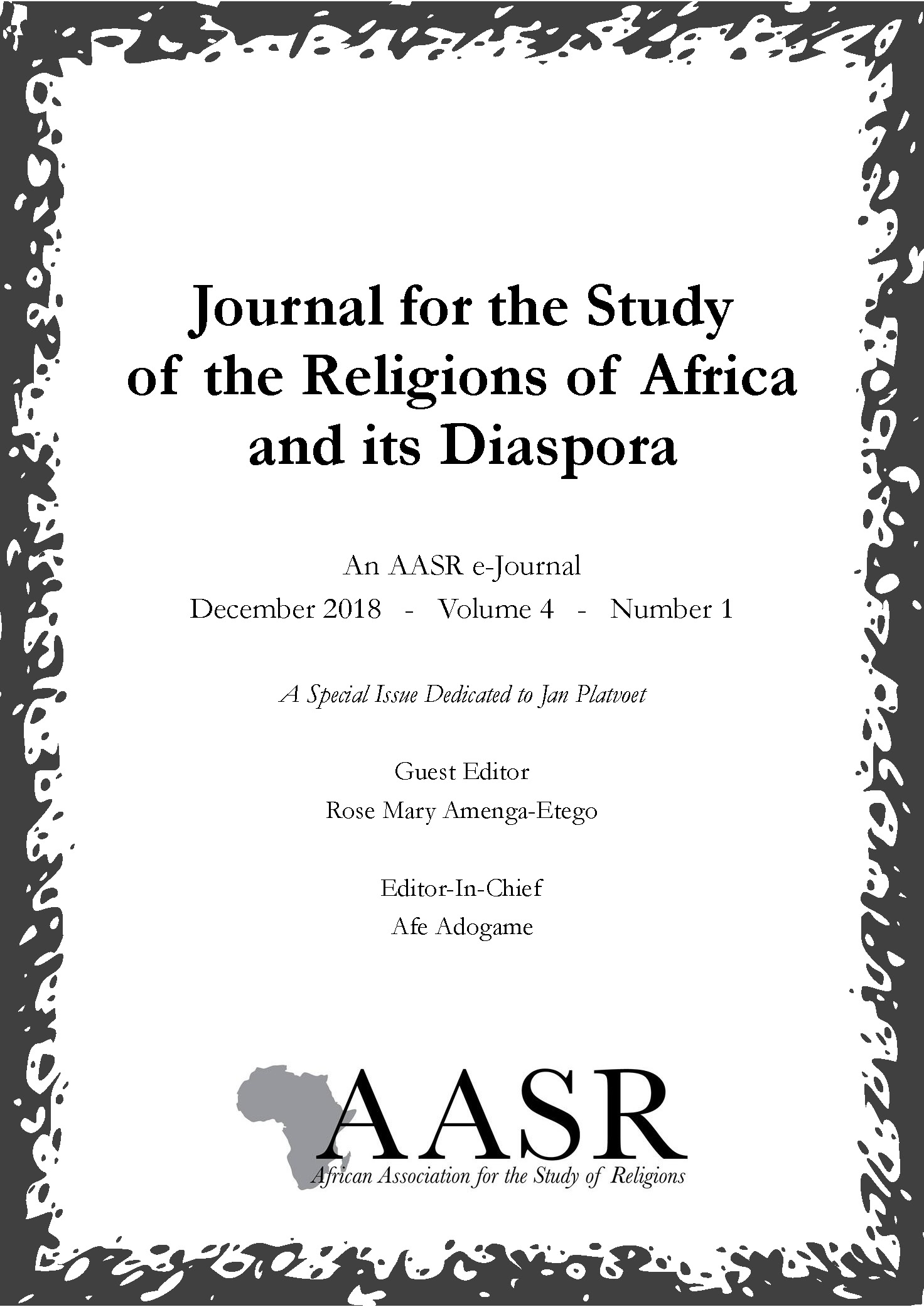Mamalawo? The Controversy Over Women Practicing Ifa Divination
Main Article Content
Keywords
Ifa, Divination, Gender, Cuba, USA, West Africa
Abstract
As the tradition of Ifa divination has gained increasing popularity and membership around the world, the previously male-dominated composition of its priesthood has become challenged. This article traces the origins of women who have sought the highest levels of Ifa initiation—primarily in Cuba and the US—engages the various arguments, concerns, and appeals to authority of the numerous players. Much of the debate hinges around ritual practice associated with the mysterious oriṣa Odu, and consequently the article addresses the relevant mythology and rituals associated with her in an Ifa context. It also places the male-oriented nature of Ifa within the larger context of Yoruba gender norms, contrasting Yoruba notions of gender with modern values of gender equality. Thus, it seeks to explain why male Ifa priests from West Africa have been eager and willing to initiate women. In addition, the article demonstrates that—contrary to many popular claims—several women have become Ifa diviners in West Africa, but that the important ways that gender is understood in a variety of different contexts, its ramifications for initiation rituals, and the rapidly growing number of female initiates in diaspora, will likely change the dynamics of the tradition going forward.
Article Metrics Graph
References
Abimbola, Wande. Ifá Divination Poetry. New York City, NY: Nok Publishers, 1977.
Abimbola, Wande. Sixteen Great Poems of Ifá. O.O.: UNESCO, 1975.
Abimbola, Wande, and Joseph M. Murphy. "The Bag of Wisdom: Ọṣun and the Origins of the Ifa Divination." In Osun across the Waters, edited by Mei-Mei Sanford, 141-54. Bloomington, IN: Indiana University Press, 2001.
Abimbola, Wande, and Ivor L. Miller. Ifá Will Mend Our Broken World: Thoughts on Yoruba Religion and Culture in Africa and the Diaspora. Roxbury: Aim Books, 2003.
Adogame, Afeosemime U. Celestial Church of Christ: The Politics of Cultural Identity in a West African Prophetic-charismatic Movement. Frankfurt Am Main: Lang, 1999.
Alakesin, Olaoshun Victoria. "Iyanifa:Cultural Implications, the Myth, the Reality." In Iyanifa: Woman of Wisdom, edited by Ayele Kumari, 94-119. Ayele Kumari, 2014.
Barber, Karin. I Could Speak until Tomorrow: Oriki, Women, and the past in a Yoruba Town. Edinburgh: Edinburgh University Press for the International African Institute, London, 1991. https://doi.org/10.1515/9780748699186
Bascom, William Russell. Ifa Divination: Communication between Gods and Men in West Africa. Bloomington: Indiana University Press, 1991.
Bascom, William Russell. Sixteen Cowries: Yoruba Divination from Africa to the New World. Bloomington: Indiana University Press, 1993.
Baudin, Noël. Fétichisme Et Féticheurs. Lyon: Séminaire Des Missions Africaines, 1884.
Capone, Stefania. "The Pae-de-santo and the Babalawo." In Ifá Divination, Knowledge, Power, and Performance, edited by Jacob K. Olupona and Rowland O. Abiodun, 223-45. Bloomington, IN: Indiana University Press, 2016.
Capone, Stefania. "Le Pai-De-Santo Et Le Babalawo." La Religion Des Orisha: Un Champ Social Transnational En Pleine Recomposition, edited by K. Argyriadis and Stefania Capone, Hermann Editions, 2011, pp. 51-95.
Bowen, T. J. Adventures and Missionary Labours in Several Countries in the Interior of Africa from 1849 to 1856. Frank Cass & Co., 1968.
Clarke, William Henry. Travels and Explorations in Yorubaland 1854-1858. University of Ibadan Press, 1972.
Curry, Mary Cuthrell. Making the Gods in New York: The Yoruba Religion in the African American Community. New York: Garland Publishing, 1997.
Doi, A. R. I. "A Muslim-Christian-Traditional Saint in Yorubaland." Practical Anthropology17, no. 6 (November 1970): 261-68.https://doi.org/10.1177/009182967001700603
Drewal, Henry John. "Art and the Perception of Women in Yorùbá Culture." Cahiers D'études Africaines, 4th ser., 17, no. 68 (1977): 545-67. https://doi.org/10.3406/cea.1977.2430
Drewal, Henry John., and Margaret Thompson Drewal. Gẹlẹdẹ: Art and Female Power among the Yoruba. Bloomington: Indiana Univ. Press, 2000.
Ellis, A. B. The Yoruba-speaking Peoples of the Slave Coast of West Africa, Their Religion, Manners, Customs, Laws, Language, Etc. London: Curzon Press, 1974.
Epega, Afolabi A., and Philip John. Neimark. The Sacred Ifa Oracle. Brooklyn, NY: Athelia Henrietta Press, 1999.
Hucks, Tracey E. Yoruba Traditions & African American Religious Nationalism. Albuquerque: University of New Mexico Press, 2014.
Peel. "Gender In Yoruba Religious Change." Journal of Religion in Africa32, no. 2 (2002): 136-66.https://doi.org/10.1163/157006602320292898
Idowu, Emanuel Bolaji. Olodumare: God in Yoruba Belief. New York: Wazobia, 1994.
Ifa Foundation International. Accessed May 10, 2018. http://www.ifafoundation.org/.
"Ifa Heritage Institute." Ifa Heritage Institute. Accessed May 10, 2018. http://www.ifaheritage.org/.
"Ifá University." Ifá University. Accessed May 10, 2018. https://ifa.university/.
Isichei, Elizabeth Allo. The religious traditions of Africa: a history. Westport, CT: Praeger, 2004. https://doi.org/10.5040/9798216007425
Jesús, Aisha M. Beliso-De. "Contentious Diasporas: Gender, Sexuality, and Heteronationalisms in the Cuban Iyanifa Debate." Signs: Journal of Women in Culture and Society40, no. 4 (2015): 817-40. https://doi.org/10.1086/680327
Johnson, James. Yoruba Heathenism. J. Townsend & Sons, 1899.


